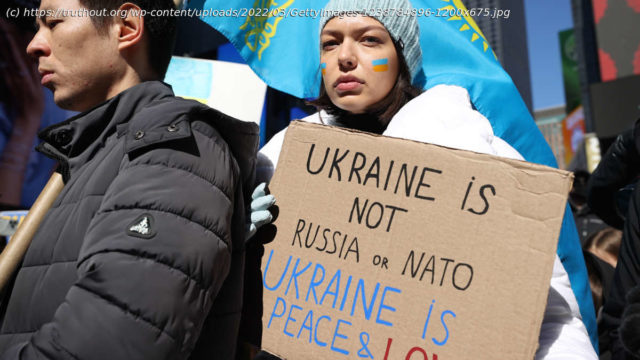To create an antiwar culture, we must demand accountability, reparations and reconciliation for U.S. war crimes.
When former U.S. President George W. Bush released a statement on Ukraine — “condemning Vladimir Putin’s unprovoked and unjustified invasion of Ukraine,” and calling on the American people to “stand in solidarity with Ukraine and the Ukrainian people as they seek freedom and the right to choose their own future” — I thought to myself, Not now, man. You’re hurting more than you’re helping. And that’s because, as very few Americans will need reminding, the Bush administration took advantage of the public’s emotional vulnerability after the 9/11 militia attacks and preexisting racial dynamics to successfully fabricate the bogeyman of “weapons of mass destruction” and lead the United States to invade and occupy Iraq and Afghanistan in the name of fighting terror. As Russia is bombing Ukraine under the purported banner of “de-nazification,” so too is the U.S. still dropping bombs in the name of combating “terror.” According to the monitoring group Airwars, the United States Coalition in Iraq and Syria is responsible for at least one civilian death in Syria, AFRICOM declared a strike in Somalia, and the U.S. is alleged to have made a strike in Yemen — all this year. To underscore the devastation these airstrikes can have on local communities, The New York Times recently published a detailed report investigating this and how supposed Pentagon accountability measures are not actually functioning. I think of statements like Bush’s as sort of “moral lemons” — stances that might look good at first glance, but actually don’t take you anywhere if you buy them. The U.S.’s “moral lemons” are actually a key part of the Russian disinformation strategy. Platforms like RT, Ruptly, Soapbox, Redfish, Breakthrough News, and more take advantage of the lack of accountability around U.S. war crimes to pump out social-media-friendly content on the subject alongside Kremlin disinformation. Such disinformation includes claims that, for example, Syrian first responders are actually terrorists, or that NATO is entirely to blame for the invasion of Ukraine, or that distort legitimate concerns about the far right in Ukraine into sweeping claims aimed at justifying the military invasion. It’s remarkably successful, including with many people who are vocally against the “war on terror” and other U.S. wars and interventions — an issue area that is resource-scarce, shame and guilt-driven, and prone to burning people out. But it cannot be emphasized enough: The U.S.’s own imperialist hypocrisy is in a symbiotic relationship with Russian imperialist propaganda. They feed off each other as a means to stir up their own nationalism. But left-oriented commentators are not the only ones who struggle to talk about war. Many more people will struggle to talk about war in a way that doesn’t reflect their own racial biases. For example, CBS News Foreign Correspondent Charlie D’Agata was swiftly condemned and later apologized for saying: “ [Ukraine] is a relatively civilized, relatively European — I have to choose those words carefully too — city, where you wouldn’t expect that or hope that it’s going to happen.” Nick Bilton at Vanity Fair said in a now-deleted tweet: “This is arguably the first war we’ve seen (actually seen in real-time) take place in the age of social media,” seemingly forgetting how the Syrian struggle against authoritarianism was so well-documented online, it directly led to dramatic growth in open-source intelligence investigation as a field. And as Dalia Hatuqa pointed out on Twitter in response to a tweet by the AP regarding Ukraine and Gaza, biases go down to the prepositional level. “Notice the use of ‘in’ and ‘on’ here,” she says, illustrating how framing Israeli airstrikes as happening “in” Gaza as opposed to “on” Gaza makes it harder for the reader to suss out power dynamics underlying the occupation.






